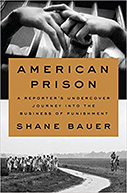American Prison: A Reporter’s Undercover Journey Into The Business Of Punishment

Author: Shane Bauer
Publisher: New York: Penguin Press, 2018. 368p.
Reviewer: Brett C. Burkhardt | July 2019
In American Prison, journalist Shane Bauer weaves together historical and contemporary narratives about prison privatization in the United States. The historical narrative spans two centuries, from the early experimental days of penitentiaries in the 19th century to the era of judicial oversight and reform in the 1970s. The contemporary narrative tells of Bauer’s experience working in a private prison in Louisiana. Both narratives are fascinating reads and provide important insights about private prisons in the United States.
In the historical study, Bauer surveys the long history of imprisonment and privatization in the US. He reviews the spread of convict leasing after the Civil War. With the abolition of slavery, Southern states confronted a problem: how could they (cheaply) harvest cash crops, mine coal, and build railroads? States quickly recognized the clause in the 13th Amendment prohibiting involuntary servitude “except as punishment for a crime.” The practice spread, with leased prisoners being subjected to inhumane work and living conditions. The death rate of leased prisoners was extraordinarily high, rivaling those in the later Soviet gulags. But Bauer avoids the facile claim that state-run punishment is per se better than private punishment. In fact, he points to various examples of state-run penal regimes that dehumanized and tortured the prisoners who were forced to work. For example, after abandoning convict leasing, many states shifted into state-run plantation systems and chain gangs. Like the earlier private enterprises, state-run penal enterprises often were driven by cruelty, exploitation, and a focus on revenue generation.
The contemporary piece of the book is based on Bauer’s 4-month stint as a guard at Winn Correctional Center, in rural Louisiana. (Bauer’s backstory gives him a unique perspective. While working as a freelance journalist in 2009, he was arrested in Iran and imprisoned for two years.) At the time of the Louisiana experience, the 1,500-bed Winn prison was operated by CCA (now called CoreCivic). Bauer paints a picture of a facility that is perpetually on the verge of chaos, the proximate cause of which is inadequate staffing. Bauer reports that staffing levels had dwindled over recent years. Now, guard watchtowers go unmanned, while a single correctional officer watches video feeds from 30 security cameras. There are no staff to offer rehabilitation programs to inmates. Inmates on suicide watch are left unattended for hours on end. The recreation yard sits empty for lack of guards. In large part, the inadequate staffing is attributable to the meager pay offered to guards: $9 per hour (versus $12.50 at public prisons in the state). Those willing to work at this rate are not well prepared for the job. Bauer recounts one day of training that involved two hours of classes followed by hours of pacing, doodling, and napping. Apparently, there were no staff to relieve the instructors of their day-to-day duties.
Inmates at Winn recognize that the COs are underpaid, underappreciated, and underprepared. Inmates repeatedly remind guards of their low station, and one points out the real power structure of the prison: “Inmates run this bitch, son” (53). The prison has a high rate of violence compared to others in the state. One rash of stabbings prompts an extended visit from CCA’s SORT team, about which Bauer offers fascinating insight. The SORT (Special Operations Response Team) group occupies a unique position in the US penal system. They function as a private, elite paramilitary operation, traveling to CCA prisons throughout the country. Wearing black tactical outfits and wielding pepperball guns, their goal is to impose order using heavy-handed tactics. State Department of Corrections employees (who also visit during a lockdown) scoff at SORT officers, whom they characterize as incompetent and arrogant combat veterans.
American Prison is a captivating read. Shane Bauer’s account of the day-to-day operations in Winn exposes a remarkable level of neglect and hostility in that prison, while the historical anecdotes make clear that those impulses have deep historical roots.
Brett C. Burkhardt, Associate Professor of Sociology in the School of Public Policy, Oregon State University


